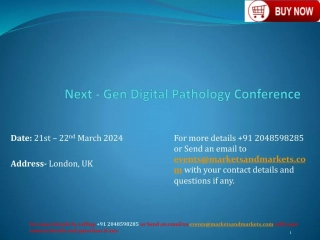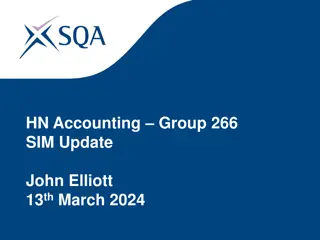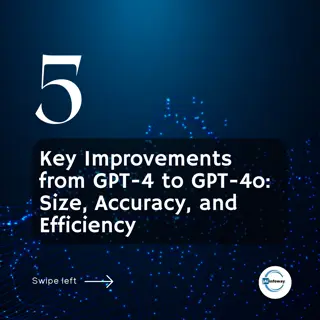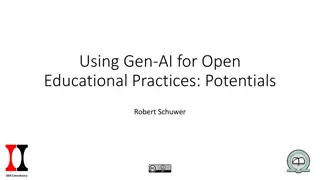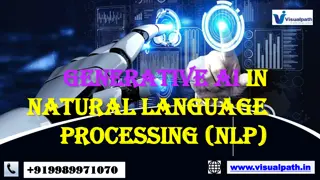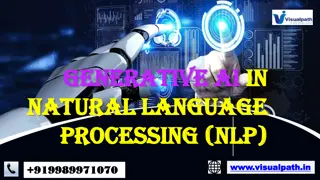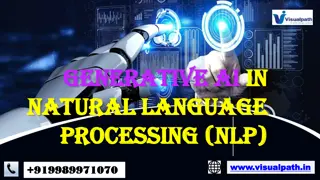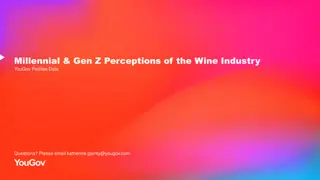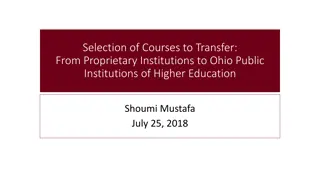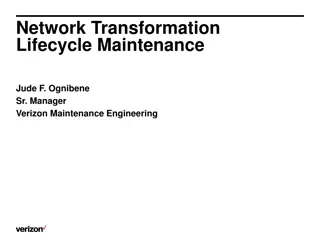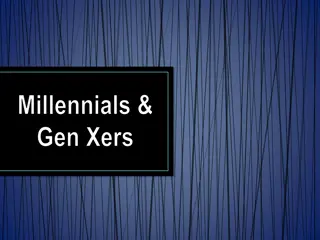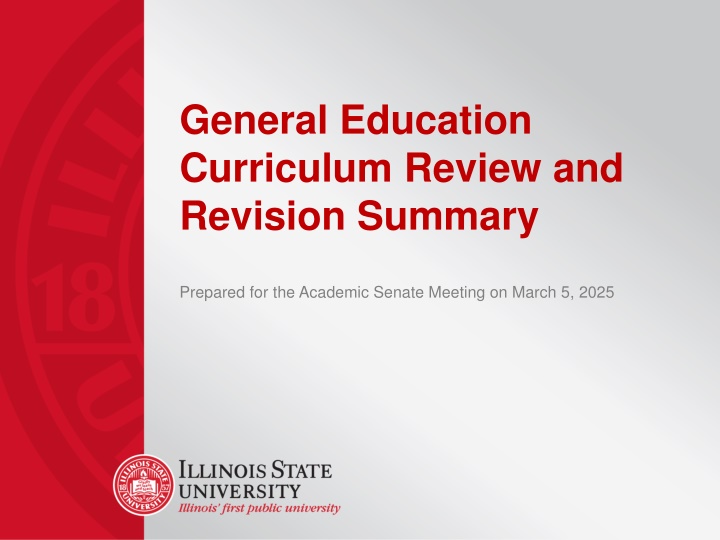
General Education Curriculum Review and Revision Summary
Review the current General Education Curriculum structure, address concerns raised by students and faculty, and propose core principles for a revised curriculum that is student-centered, flexible, innovative, and faculty-friendly.
Uploaded on | 3 Views
Download Presentation

Please find below an Image/Link to download the presentation.
The content on the website is provided AS IS for your information and personal use only. It may not be sold, licensed, or shared on other websites without obtaining consent from the author. If you encounter any issues during the download, it is possible that the publisher has removed the file from their server.
You are allowed to download the files provided on this website for personal or commercial use, subject to the condition that they are used lawfully. All files are the property of their respective owners.
The content on the website is provided AS IS for your information and personal use only. It may not be sold, licensed, or shared on other websites without obtaining consent from the author.
E N D
Presentation Transcript
General Education Curriculum Review and Revision Summary Prepared for the Academic Senate Meeting on March 5, 2025
TABLE 1. CURRENT GENERAL EDUCATION CURRICULUM Categories Requirement Group 1 Communication and Composition 2 Courses Mathematics 1 Course Natural Sciences 2 Courses United States Traditions 1 Course Individuals and Civic Life 1 Course Group 2 Fine Arts 1 Course Humanities 1 Course Language in the Humanities 1 Course Quantitative Reasoning 1 Course Science, Math, and Technology 1 Course Social Science 1 Course Totals 11 Categories (13 courses) 39 Credit Hours
CONCERNSWITH CURRENT GE CURRICULUM Based on student surveys taken in 2019 and 2022 and faculty, student, and advisor focus groups held in Spring 2020 (prior to Covid-19). Need to improve transferability between ISU and IAI. Limited number of courses/seats in some categories (e.g., LH). Some categories are too discipline-specific and place a high burden on a small number of departments to provide enough courses to meet demand. No significant changes have been made in 35 years. Concern that the current structure is too science and math- heavy. The two-tiered structure makes course scheduling difficult. Despite the 39 required hours, 28 programs have a 1-course exemption. Current structure does not connect to the major in a meaningful way.
CONCERNSWITH CURRENT GE CURRICULUM Students do not understand the why of general education and view general education as a burden or checklist rather than an opportunity. Many faculty do not want to teach within the current General Education Curriculum. The curriculum must better reflect the expertise and interests of current ISU faculty. Too many categories (13) resulting in a curriculum that lacks sufficient coherence, predictability, and focus. Difficulty with assessment of the current General Education Curriculum (a concern in ISU s last HLC review). Many general education classes are large and lack the pedagogy to engage students like small classes do. While large courses are needed due to budget limitations, many of the courses in the current curriculum were initially conceived of as smaller classes with accordingly different pedagogies.
CORE PRINCIPLESFOR REVISED CURRICULUM PROPOSAL Student centered. Flexible for time to degree. Innovative. Transfer (IAI) friendly. A Gen Ed curriculum in which faculty want to teach and that reflects contemporary faculty expertise. Created with consideration of assessment. Between 30-36 credit hours.
GEN ED REVIEW & REVISION PROCESS Fall 2019. CGE and Provost Murphy issued the charge to review and potentially revise the existing General Education Program. Executive Task Force formed with representatives from all colleges and stakeholder groups based on a call for volunteers. 2019 and 2022. Students completed general education surveys. Data from these surveys informed the work of the taskforce throughout the process. Spring 2020. 12 campus focusgroups were held (4 faculty groups, 4 advisor groups, 2 administrator groups, and 2 student groups. (COVID prevented more) Summer/Fall 2020. revised structure, vision, and learning outcomes were drafted based on student survey and focus group data.
GEN ED REVIEW & REVISION PROCESS Spring 2021. Draft revisions were presented to stakeholder groups for informal discussion and feedback. (CGE, faculty not on GE Exec Task Force, UCC, Honors Program, Advisors). AY 2021 2022. Revised proposed structure, vision, and learning outcomes in light of discussion held in Spring 2021. Spring 2022. Presented work-in-progress to all College Curriculum Committees, CGE, Academic Affairs Committee, and UCC. Spring 2022. A second student general education survey was conducted. AY 2022 2023. The taskforce revised the structure and learning outcomes in light of all feedback collected in Spring 2022. Spring 2023. A survey focusing on student writing needs was distributed to all faculty. Based on this survey a second writing category was added to the structure ( Information Fluency through Writing )
GEN ED REVIEW & REVISION PROCESS Fall 2023. Full Draft Proposal Competed. Two campus-wide Town Hall meetings were held on September 15 and September 29. Online survey open to the entire campus community. Fall 2023 Spring 2024. Significant revisions were made to structure and category definitions based on Town Hall and Campus Survey feedback. Spring 2024. Final Revised Proposal submitted to CGE in accordance with shared governance process. Fall 2024. Initial presentation of the Gen Ed Taskforce Proposal to the Academic Senate and additional feedback received. Fall 2024 Spring 2025. The Proposal and comments submitted on the Gen Ed program revision were reviewed by the Academic Affairs Committee. Spring 2025. Presentation of the Gen Ed Program Revision proposal to the Academic Senate by the Academic Affairs Committee.
VISION Illinois State University s General Education Curriculum prepares students who can thrive in a complex, interconnected, and global world because they are: Informed by knowledge of the natural, sociocultural, technical, and creative worlds and able to critically analyze this knowledge. Engaged with cross-disciplinary skills and the research/scholarly tools to exercise intellectual curiosity; and Responsible for acting with an understanding of personal agency, civic and democratic values, and social justice as they learn how to apply their knowledge and skills to make positive contributions in their communities, democracies, and the world.
LEARNING OUTCOMES Informed learner: A deeper understanding of the world, both as human beings and as contributing individuals, is essential. This understanding must accompany an awareness of the intersections and permeability of disciplinary boundaries associated with knowledge. Through the General Education Curriculum, students will have opportunities to learn how to: 1.1 Examine the human condition (imagination, expression, and/or cultures). 1.2 Compare and contrast interrelations within and among global or cross-cultural communities. 1.3 Distinguish means of modeling the natural, social, technical, logical, and/or creative worlds.
LEARNING OUTCOMES Engaged learner: The cross-disciplinary skills students need are extensive, sophisticated, and expanding with the increase of new technologies. These skills extend beyond core concepts to include the ways of investigating and interacting with human society and the natural world. As students progress through the General Education Curriculum and into their major/degree programs, students will learn to: 2.1 Communicate in diverse settings and groups (orally, visually, and in writing). 2.2 Analyze problems using systematically acquired data. 2.3 Integrate information discerningly from a variety of sources. 2.4 Manage change through intellectual and digital agility. 2.5 Collaborate in diverse teams. 2.6 Transform knowledge into judgment and action. 2.7 Derive meaning from experience and information gathered through observation.
LEARNING OUTCOMES Responsible learner: The integrity of a democratic society depends on individuals sense of social responsibility, ethical judgment, and concern for others. These attributes contribute to the exploration of important issues in ways that respect a variety of viewpoints and lead to a deeper understanding of the world. The General Education Curriculum will foster the development of these qualities among students, specifically students will learn how to: 3.1 Demonstrate responsibility for contributing to a more just, equitable, and sustainable world. 3.2 Demonstrate respect for the complex identities of others, their histories, and their cultures. 3.3 Enact values and practices reflecting democratic processes. 3.4 Engage respectfully with multiple perspectives. 3.5 Justify a position based on ethics, consequence(s) of decision, and/or personal values.
TABLE 2. PROPOSED GENERAL EDUCATION CURRICULUM Requirement (credit hours) Categories Information Fluency Through Writing 3 Communication Inquiry 3 Applied Writing Inquiry 3 Quantitative Literacy 3 Scientific Literacy 3 Exploring the Human Condition 3 Creative Arts 3 Individuals and Society 3 Science, Technology, Engineering, and Mathematics 3 Experiential Learning and Civic Engagement 3 General Education Elective 3 11 Categories 33 Credit Hours
SIGNIFICANT CHANGES Increased focus on globalization, social justice, problem-solving, and civic engagement. New category on experiential learning and civic engagement. Decrease in credit hours required by 3-6. Increase cross-disciplinarity (decrease siloing ). Provide students more flexibility and control by adding a general education elective. Provide the opportunity to make meaningful connections between courses by creating Certificates. Ability for departments to think more broadly in category selection.
CHANGES SINCE LAST PRESENTATIONATTHE ACADEMIC SENATE All learning outcomes under each category need to be met by a proposed course (pages 3-13). The description for the Scientific Literacy category was adjusted to allow for introductory courses, not only courses that examine methodologies (page 7). The Exploring the Human Condition category allows for humanities and social sciences to propose courses (page 8). The Science, Technology, Engineering, and Mathematics category, requires at least one STEM discipline, not two (page 11). Drafted an implementation plan.
SAMPLE IMPLEMENTATION PLAN Fall 2028 as the start date. Current students will complete the general education program based on catalog year (incremental transition to the new Gen Ed program). Council for General Education (CGE) reviews Gen Ed courses: Expedited approval (similar category, same credit hours, 75% of content, no prerequisites) Regular approval. Mandatory assessment. 5-year course review similar to IAI. No category exemptions.
THEMESIN QUESTIONSAND CONCERNS Reduction in credit hours. Number of hours in Math and Science. Labs. Number of hours in Social Sciences. Insufficient courses in Experiential Learning and Civic Engagement. Gen Ed Elective category. Implementation plan. IAI alignment and articulation. Comparator institutions. Listing courses in multiple categories. Non-experts teaching in different areas/disciplines. Assessment.
CHANGESIN ASSOCIATED POLICIESAND DOCUMENTS Policy 2.1.12 Pass/No Pass Credit/No Credit Delete reference to Group 1. Clarify credit hours. Delete Institutes courses. Policy 2.1.9 Baccalaureate Degree Programs Delete reference to category exemptions. Clarify prerequisites, major blocking, course listing under one Gen Ed category, relation to AMALI and IDEAS, and review process. Undergraduate Catalog Update the credit hours and number of courses to 33 and 11, respectively. Replace previous categories with the revised 11 categories. Delete the list of courses corresponding to each category (the list will be updated as courses are placed under the new Gen Ed program).
TABLE 3. CATEGORY EXEMPTIONSAND DOUBLE DIP Number Percent Number of majors 177 100% Majors with category exemption 153 86.4% Majors with double dips 119 67.2% Majors with both category exemption and double dip 102 57.6% Range of double dipped courses per major 1-8 Majors requiring 39 credit hours of general education 2 1.1% Majors requiring a specific math course 74 41.8%
TABLE 4. NUMBEROF GEN ED COURSESBY COLLEGE College/Unit Number Percent College of Applied Science and Technology 15 6.7% College of Arts and Sciences 126 56.3% College of Business 2 0.9% College of Education 2 0.9% Mennonite College of Nursing 1 0.4% Wonsook Kim College of Fine Arts 57 25.4% Office of the Provost (IDS) 21 9.4% Total 224 100%
TABLE 5. TASKFORCE BENCHMARK INSTITUTIONS # of SCI/MAT courses Institution Gen Ed Credit Hours Ball State University 41-56 2-3 Bowling Green State University 36 3 Clemson University 31 4 Miami University (Ohio) 42 5 University of California, Riverside Varies by college Varies by college University of California, Santa Cruz 52 5 University of North Carolina, Greensboro 33 3 University of Wisconsin, Milwaukee Varies by college Varies by college
TABLE 6. COMPARISONWITH NON-ILLINOIS INSTITUTIONS # of SCI/MAT courses Institution Gen Ed Credit Hours Illinois State University 39 5 Ball State University 41-56 2-3 California State University, Fresno 48 3 California State University, San Bernardino 49 3-4 James Madison University 41 3 Miami University (Ohio) 42 5 Montclair State University 42 2-3 Northern Arizona University 30 4 University of North Carolina, Charlotte 32 3-4 University of North Carolina, Wilmington 64 3-4 University of Rhode Island 40 2 West Chester University of Pennsylvania 43-47 3 Clemson University 31 4 Iowa State University 32 3 University of Missouri 36 4
TABLE 7. COMPARISONWITH ILLINOIS INSTITUTIONS # of SCI/MAT courses Institution Gen Ed Credit Hours Illinois State University 39 5 Illinois Articulation Initiative (IAI) 37-41 3 Chicago State University 42 4 Eastern Illinois University 40 3-4 Governors State University 38-41 3 Northeastern Illinois University 33 3 Northern Illinois University 33 3 Southern Illinois University, Carbondale 39 3 Southern Illinois University, Edwardsville 39 3 University of Illinois, Chicago 30 3 University of Illinois, Springfield 39 3 University of Illinois, Urbana-Champaign 40 4 Western Illinois University 37 3
TABLE 8. SAMPLE MAPPINGOF CURRENT COURSESTONEW GENERAL EDUCATION CURRICULUM # of # of Current Gen Ed Categories New Gen Ed Categories Courses (sample) Courses Information Fluency Through Writing Communication & Composition 2 1 Language in the Humanities 37 Communication Inquiry 2 Natural Science 14 Applied Writing Inquiry 37 Humanities 48 Quantitative Literacy 13 Fine Arts 55 Scientific Literacy 14 Social & Behavioral Sciences 29 Exploring the Human Condition 48 Science, Mathematics, & Technology 24 Creative Arts 55 Mathematics 4 Individuals and Society 52 Science, Technology, Engineering, and Mathematics Quantitative Reasoning 9 24 Experiential Learning and Civic Engagement United States Traditions 12 61 Individuals and Civic Life 12 General Education Elective 246 Total 246 Total TBD
TABLE 9. IAI/ISU GEN ED COMPARISON IAI (37+ hours) Current ISU Curriculum (36+) Proposed ISU Curriculum (33+) Communication & Composition (3) Communication & Composition (3) Language in the Humanities (3) Information Fluency Through Writing (3) Communication Inquiry (3) Applied Writing Inquiry (3) Communication (9) Physical & Life Science (6) Natural Science (6) Scientific Literacy (3) Humanities (3) Fine Arts (3) Exploring the Human Condition (3) Creative Arts (3) Humanities & Fine Arts (9) Social & Behavioral Sciences (9) Social & Behavioral Sciences (3) Individuals & Society (3) Science, Technology, Engineering, and Mathematics (3) Science, Mathematics, & Technology (3) Mathematics (3+) Quantitative Reasoning (3) Math (4+) Quantitative Literacy (3) Experiential Learning & Civic Engagement (3) General Education Elective (3) United States Traditions (3) Individuals and Civic Life (3)


